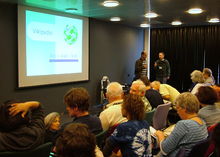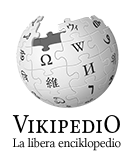Esperanto Wikipedia
|
|
|
|---|---|
| La libera enciklopedio | |
| Internet encyclopedia | |
| languages | Esperanto |
| operator | Wikimedia Foundation |
| editorial staff | Wikipedia community |
| Registration | Possible (optional) |
| On-line | November 2001 (currently active) |
| //eo.wikipedia.org | |
The Esperanto Wikipedia was launched on November 15, 2001 by the American Chuck Smith. In June 2008 it passed the 100,000 mark and in August 2014 it exceeded 200,000 articles; this makes it one of the larger Wikipedias . In Esperanto , Wikipedia is called Vikipedio .
Internal and special
As with other non-national or pluricentric languages, there is no country to which the language version has special reference. Of the 186 registered users who spoke Esperanto at least level eo-3 and who indicated their mother tongue on the user page, 38 (one fifth) said English and 35 German . Then came French , Dutch , Russian and Spanish (as of March 2008). Among the registered users of the Vikipedio , ten stated Esperanto as their mother tongue, 54 rated their level as comparable to their mother tongue (as of March 2008).
In the Wikipedia code (of the source text) of the Esperanto Wikipedia, the special feature is that the letter combinations cx, gx, hx, jx, sx and ux result in the Esperanto special characters (ĉ, ĝ etc.). If you really want to write the letter combination, for example in Bordeaux, then you double the x: ux becomes ŭ, uxx becomes ux. This special regulation sometimes causes problems for foreign-language users who do interwiki work, for example . It was installed at the time by Brion Vibber, a pioneer of Esperanto Wikipedia and later chief engineer of the Wikimedia Foundation . This input method is only valid when using the wikitext editor. In the Visual Editor , the special characters must be entered directly via the keyboard.
In October 2006, there was controversy over a list of people who have Esperanto as their mother tongue. Some have seen it as a violation of personal rights . Others, however, like the Slavic Studies professor Jouko Lindstedt , who moderates a mailing list on the subject of Esperanto as a mother tongue, pointed out that Esperanto mother tongue is not a secret in the language community. In case of doubt, however, he assessed the right of personality as being of higher importance.
History and statistics
| Where do the adaptations of the Esperanto Wikipedia come from? | ||||
|---|---|---|---|---|
| Germany | 33.7% | |||
| Cuba | 10.5% | |||
| Netherlands | 7.5% | |||
| Uncertain | 5.2% | |||
| France | 5.2% | |||
| Japan | 4.5% | |||
| United States | 3.7% | |||
| Spain | 3.4% | |||
| Poland | 3.0% | |||
| Switzerland | 2.2% | |||
| Russia | 2.2% | |||
| Georgia | 2.2% | |||
| Italy | 1.9% | |||
| United Kingdom | 1.9% | |||
| Australia | 1.5% | |||
| Argentina | 1.5% | |||
| Canada | 1.5% | |||
| Czech Republic | 1.1% | |||
| Croatia | 1.1% | |||
| Other | 6.6% | |||
| (Percentage of edits, December 1, 2014 - December 31, 2014) | ||||
| From where the Esperanto Wikipedia is accessed, by country. | ||||
|---|---|---|---|---|
| United States | 18.3% | |||
| Australia | 8.5% | |||
| France | 7.8% | |||
| Germany | 7.2% | |||
| China | 5.7% | |||
| Netherlands | 5.4% | |||
| Spain | 4.4% | |||
| Poland | 3.9% | |||
| Italy | 3.9% | |||
| Uncertain | 3.1% | |||
| Brazil | 3.1% | |||
| Other | 28.7% | |||
| (Percent of views by country, December 1, 2014 - December 31, 2014. 0.005% of views from the global population.) |
||||
On May 11, 2001, a Wikipedia employee reported that he had added nine other Wikipedias to the English one, namely in Catalan , Chinese , Esperanto, French, German, Hebrew , Italian , Japanese , Portuguese , Spanish and Russian.
The expansion of Esperanto Wikipedia actually started on November 15, 2001, by the American computer scientist Chuck Smith with two colleagues. He was able to use 173 articles from the Enciklopdio Kalblanda by Stefano Kalb. One year after it was founded, there were a total of 51 vikipediistoj (Wikipedians), twenty of them "very active" (more than 100 changes per month). A total of 4,200 articles were compiled. The development was pretty continuous.
During 2007, an average of twelve new Wikipedians were added each month (2006: twenty). In January 2008 the statistics counted a total of 860 Wikipedians, 41 of them very active, who had produced 94,000 articles together.
In mid-January 2011 there were over 139,800 articles available on Esperanto Wikipedia, in August 2014 there were over 200,000 articles.
Significance for the language area
The two most important encyclopedic works in Esperanto are the Enciklopedio de Esperanto (a technical dictionary, 1934) and Esperanto en perspective (a manual, 1974). You deal with the Esperanto language and its language community. Numerous magazines from Esperanto professional associations and also the Scienca Revuo deal with other topics without an encyclopedia. Seen in this way, the Vikipedio is the first real encyclopedia in Esperanto.

An important text donation for the Vikipedio is the Enciklopedio de Esperanto . Some book authors have given permission to use their overview work on Esperanto by stating their origin, as has the political and social magazine MONTOO, which appears in Antwerp .
The World Esperanto Federation itself is not involved in the work on the Vikipedio , but provides rooms for Wikipedia meetings and courses at its events. The Esperanto press reports frequently, for example Libera Folio or Kontakto . At least two members of the Esperanto Academy are Wikipedians, in addition to Gerrit Berveling also Bertil Wennergren, the director of the Lexik section .
Web links
Individual evidence
- ↑ a b La Esperanta Vikipedio atingis 200,000 artikolojn . In: Libera Folio. August 14, 2014. Retrieved August 16, 2014.
- ↑ Publika listo de denaskuloj kaŭzas disputon . In: Libera Folio. October 9, 2006. Retrieved August 16, 2014.
- ↑ Page Edits Per Wikipedia Language Wikistats SquidReport, de.wikipedia.org for the period: December 1, 2014 - December 31, 2014
- ↑ Access statistics of all Wikipedia articles. Wikistats SquidReport, de.wikipedia.org for the period: December 1, 2014 - December 31, 2014
- ^ Jason Richey: new language wikis . In: Mailing list Wikipedia-l. May 11, 2001. Retrieved July 4, 2014.
- ↑ a b Wikipedia Statistics Esperanto , accessed on July 4, 2014.


